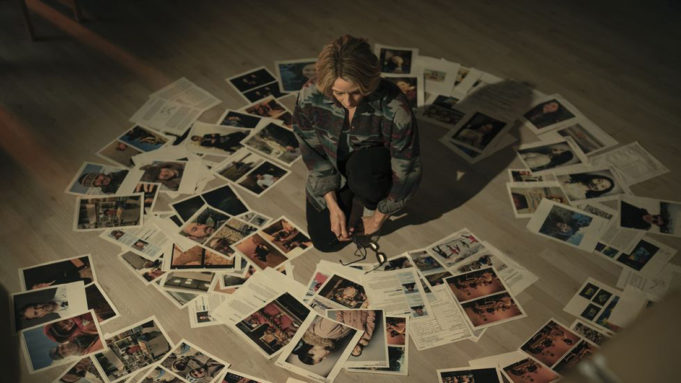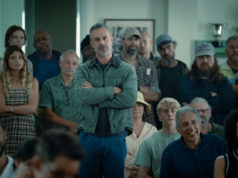Early in Episode 2 of True Detective: Night Country, tough cop Evangeline Navarro (Kali Reis) drops in on Fiona Shaw (Rose Aguineau), a local who recently found a group of missing scientists with the help of the ghost of her dead boyfriend. Aguineau’s character sets up the entire show for viewers by telling Navarro all the reasons ghosts might appear. You know, things like they miss you, they need you, or they want you to be a ghost, too, but it all might be nothing because she also warns, “Don’t confuse the spirit world with mental health issues.”
These confounding rules for what becomes commonplace in True Detective Season 4 establish the tone for what follows: a lack of commitment to originality and good storytelling and also a departure from the realism of previous seasons. Night Country aspires for new ground but reminds viewers from the outset it’s playing tennis without a net.
Night Country is set in Ennis, Alaska, a fictional small town north of the Arctic Circle. Like real locations in that part of the globe, Ennis can go as long as 65 days in complete darkness, which makes for an appropriately creepy setting. The show follows two very sullen and hard-to-like cops as they struggle with an unsolved murder, a mining company opposed by the native population, and a new mystery stemming from the disappearance of the scientists. Like earlier seasons, the detectives must deal with their demons (which take precedence over everything else here) and come together to solve the mystery, this time in the heart of “Night Country.”
Isa Lopez’s vision as showrunner and writer for this new take on True Detective seems, at first, hopeful. Clearly interested in subverting norms to update the series, she makes some interesting and enjoyable decisions early on. By ditching the gothic-tinged opening songs prominent in past seasons from artists like The Handsome Family and Leonard Cohen in favor of Billie Eilish, Lopez declares that women will dominate. Though Eilish might seem an odd fit for a series like this, her droning lyrics over the frenetic intro credits effectively create a mood.
The most noticeable departure from past seasons is that stark lack of testosterone. Scoring Jodie Foster as Liz Danvers was a big win. The Oscar winner turns out a great performance as a police chief exiled to the hinterlands. Though like most of the other characters, she is downright unlikable, and instead of being balanced out by a partner with a different disposition, we get another grumpy and likewise unlikable lead, Navarro. The rest of the cast is made up of virtual unknowns aside from John Hawks (Deadwood) as previous police chief Hank Prior and Christopher Eccleston (The Leftovers) as Danvers’ boss and sometimes lover Ted Connelly. Both actors add much-needed depth as morally questionable lawmen. Conversely, rookie cop Peter Prior (Finn Bennett) does a great job contrasting the corrupt older men and proves to be one of the only likable characters onscreen. He also ends up driving much of the detective work. Though the acting is strong, the cast members have little to do with a bad script and endless scenes of empty promises.
Night Country has a lot of basic problems. First, the show lacks originality. The storyline seems to have been taken straight from Season 1 of AMC’s Dark Winds: an investigation involving native tribes, killers loose in the sprawling back country (the desert in lieu of the frozen tundra), supernatural elements arising from tribal superstitions, and an evil mining company. There are also echoes of Twin Peaks with its weird mythos, The Thing with the scientific lab possibly uncovering something supernatural, and a flawed female detective working with a younger, greener detective in Mare of Easttown.
Yet none of this is as troublesome as Lopez’s attempts to retcon one of the more contentious parts of the True Detective anthology. The final episode of Season 1 left many viewers and critics wanting more when in the end there were no supernatural elements. It turned out it was just some crazy cult, but the heightened intensity of that final episode lay in the possibilities. The audience didn’t know what to expect. Lopez deflates all chances of this type of ambiguity and nuance by ditching this trope. Instead of providing the sophistication of the supernatural mixed with the unfolding murder investigation, Night Country dives headlong into the supernatural in the first episode. Now the show must either deliver on this supernatural promise or find some alternative explanation for the voices everyone in town is hearing. Either way, it’s not a murder mystery. It’s The Thing.
And this is to say nothing about the show’s pacing problems and narrative issues. The first episode works well, but very little happens in the ensuing four. The story meanders, with Lopez preferring to focus more on the issues of the native population and the internal lives of the detectives than on creating an interesting mystery. Of course, the native population deserves the focus and character development is important, but Lopez opts to tell instead of show through a series of exposition dumps that slow the pace to a dead stop.
Doing most of the real detective work, Danvers’ protégé Peter functions like Inspector Gadget’s niece. The only truly competent person, he is the FBI and Lisbeth Salander all rolled into one, and the only device pushing the investigation forward is everything he discovers.
With one episode left, there is much to tie up. What is the supernatural force at work in Ennis? What is hiding in the ice caves? The only real hope is for Lopez to go fully supernatural and have Danvers, Navarro, and company march into the caves and fight a swirly snake monster (this is what the previews seem to be hinting at), but something tells me this is all a hallucination brought on by the evil mining company’s drilling, and the only thing they are going to find in those tunnels is a disappointment similar to what it is like watching this great series melt down.













You throw lots of pop culture references around, but lack real edge. Whether you like or dislike True Detective: Night Country, it does not lack edge. Your mentions of The Thing are baseless. And Rustin and Marty were both unlikable in the brilliant season one–but they were men. You flirt with wearing your chauvinism on your sleeve. I don’t know if this iteration of True Detective can stick the landing, but Night Country’s possible stumble is braver and more thought-provoking than most hit productions altogether. It’s more like Taylor Sheridan’s Wind River than Dark Winds . . . and if the magical realism is overdone, at least it’s done with an ambition that reckons on the right side of humanity and history. Yosemite?